Related Research Articles
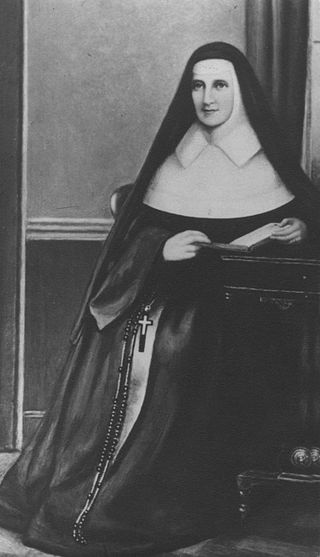
The Sisters of Mercy is a religious institute of Catholic women founded in 1831 in Dublin, Ireland, by Catherine McAuley. As of 2019, the institute has about 6200 sisters worldwide, organized into a number of independent congregations. They also started many education and health care facilities around the world.

Bishop John Quinlan was a Catholic bishop and the second Bishop of Mobile.
William Maziere Brady (1825–1894) was an Irish priest, ecclesiastical historian and journalist who converted to Roman Catholicism from Anglicanism.
Achilles Daunt (1832–1878) was a noted Irish preacher and homilist, and Anglican dean of Cork.
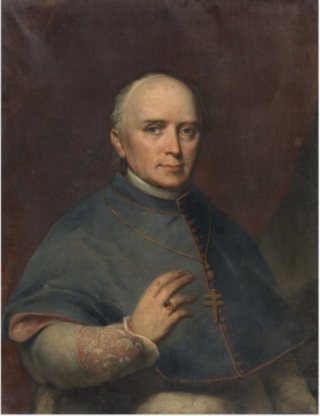
Daniel Murray was a Roman Catholic Archbishop of Dublin.
Francis Moylan (1735–1815) was the Roman Catholic Bishop of Cork, having first served as Bishop of Bishop of Ardfert and Aghadoe in Kerry.
Edmund Tanner was an Irish Jesuit, Roman Catholic Bishop of Cork and Cloyne, Ireland, from 1574 to 1579.
The Diocese of Ross was a separate diocese situated in south-west Ireland. Following the Reformation, there were two dioceses. In the Church of Ireland, the diocese is now part of the Diocese of Cork, Cloyne and Ross. In the Roman Catholic Church, it is part of the Diocese of Cork and Ross. In the 19th century, an exclave of the diocese existed around that part of the Beara peninsula in County Cork including the area around Glengariff though not as far east as Bantry. The main diocesan territory was centred on the towns of Baltimore, Skibbereen, Rosscarbery and Clonakilty which lie along the modern national road N71.
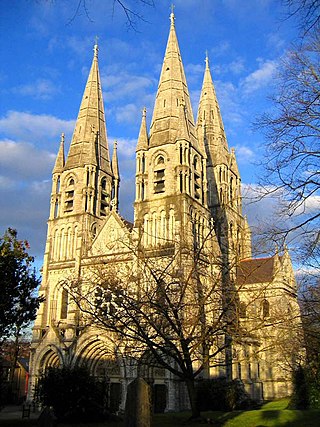
The Diocese of Cork, Cloyne and Ross, also referred to as the United Diocese of Cork, Cloyne and Ross, is a diocese in the Church of Ireland. The diocese is in the ecclesiastical province of Dublin. It is the see of the Bishop of Cork, Cloyne and Ross, the result of a combination of the bishoprics of Cork and Cloyne and Ross in 1583, the separation of Cork and Ross and Cloyne in 1660, and the re-combination of Cork and Ross and Cloyne in 1835.

The Irish College in Paris was for three centuries a major Roman Catholic educational establishment for Irish students. It was founded in the late 16th century, and closed down by the French government in the early 20th century. From 1945 to 1997, the Polish seminary in Paris was housed in the building. It is now an Irish cultural centre, the Centre Culturel Irlandais.
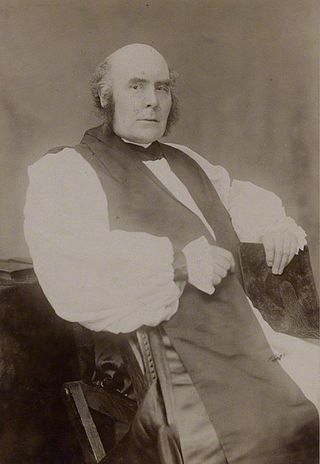
Robert Samuel Gregg was a 19th-century Anglican bishop.

William Timothy Cotter (1866–1940) was an Irish-born prelate who served as the third Roman Catholic Bishop of Portsmouth, England, from 1910 to 1940.
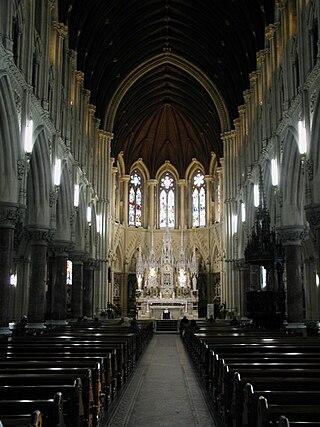
The Diocese of Cloyne is a Roman Catholic diocese in Ireland. It is one of six suffragan dioceses in the ecclesiastical province of Cashel.
Edward Synge, D.D., M.A., B.A. (1659–1741) was an Anglican clergyman who served in the Church of Ireland as Chancellor of St Patrick's Cathedral, Dublin (1705–1714), Bishop of Raphoe (1714–1716), and Archbishop of Tuam (1716–1741).
Irish College at Lisbon or St. Patrick's College, Lisbon was set up during the Penal Times, by a group of Irish Jesuits, supported by a number of Portuguese Nobles, in Lisbon.
Henry Francis Neville was an Irish Roman Catholic priest and educator who served as Rector of the Catholic University of Ireland and Dean of Cork.

The Irish College at Salamanca,, it was endowed by the King of Spain and dedicated as the St Patrick’s Royal College for Irish Noblemen. It was founded by Rev. Thomas White SJ, formerly of Clonmel, Ireland, in 1592 to house the students of that country who came to Salamanca due to the English persecution of the Catholics. The students resided at the college while attending lectures at the University of Salamanca.
Dr. Patrick Sheridan was the Church of Ireland Bishop of Cloyne between 1679 and 1682.

John Baptist Sleyne was Roman Catholic Bishop of Cork and Cloyne and Apostolic Administrator of the diocese of Ross, who was an enthusiastic patron of the Gaelic language and culture, and an advocate of the severely repressed Roman Catholic population, in Ireland during the early period of the Penal Laws. He was one of only two bishops to minister in Ireland at the end of the 17th century. Sleyne was very learned in languages and moral theology, and had traveled widely. He was known to and had interactions with kings, queens, popes and wider cultural and religious establishment throughout Ireland and Europe. Because Sleyne "remain[ed] in the kingdom contrary to the [penal] law", of the time, he went into hiding. He was eventually brought before the courts in 1698 and spent five years in prison in Cork Gaol. During his time as Bishop, both as fugitive and prisoner, Sleyne ordained many priests and consecrated several bishops in Ireland. He was eventually exiled to Portugal, on 11 February 1703, where he was given shelter in the Irish Dominican Convento do Bom Sucesso, Lisbon. He died in Portugal on 16 February 1712, aged 74 years and is buried at the altar of the Sacred Heart in the Church of Nossa Senhora do Bom Sucesso.
Bishop William Coppinger (1753-1830) was an Irish Catholic priest, who served as Bishop of Cloyne and Ross, from 1791 until his death.
References
- ↑ The Oxford History of the Irish Book, Volume IV:The Irish Book in English edited by James H. Murphy. Oxford University Press, 2011.
- ↑ Boyle, Patrick. "Irish Colleges, on the Continent." The Catholic Encyclopedia Vol. 8. New York: Robert Appleton Company, 1910. 15 March 2020
 This article incorporates text from this source, which is in the public domain .
This article incorporates text from this source, which is in the public domain . - ↑ Dublin Almanac and General Register of Ireland, Pettigrew & Oulton, 1835, p. 130
 This article incorporates text from this source, which is in the public domain .
This article incorporates text from this source, which is in the public domain . - ↑ O'Riordan, John. "Diocese of Cloyne." The Catholic Encyclopedia Vol. 4. New York: Robert Appleton Company, 1908. 16 March 2020
 This article incorporates text from this source, which is in the public domain .
This article incorporates text from this source, which is in the public domain . - ↑ The Correspondence of Catherine McAuley, 1818-1841,(Kevin L. Hughes, ed.), CUA Press, 2004, p. 351 ISBN 9780813213958
- ↑ "Most Rev.Bartholomew Crotty", Diocese of Cork and Ross